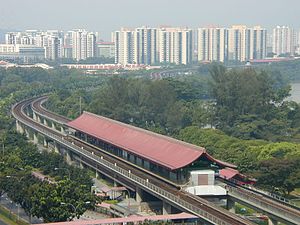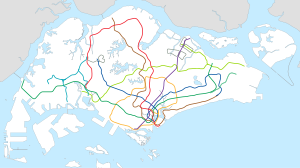Lakeside MRT station
Lakeside
EW26 湖畔
ஏரிக்கரை | |||||||||||
|---|---|---|---|---|---|---|---|---|---|---|---|
| Mass Rapid Transit (MRT) station | |||||||||||
 Exterior of Lakeside MRT station, which is adjacent to Jurong Lake in the background. | |||||||||||
| General information | |||||||||||
| Location | 201 Boon Lay Way Singapore 649845 | ||||||||||
| Coordinates | 1°20′40.52″N 103°43′16.10″E / 1.3445889°N 103.7211389°E | ||||||||||
| Owned by | Land Transport Authority (LTA) | ||||||||||
| Operated by | SMRT Trains Ltd (SMRT Corporation) | ||||||||||
| Line(s) | |||||||||||
| Platforms | 2 (1 island platform) | ||||||||||
| Tracks | 2 | ||||||||||
| Connections | Bus, Taxi | ||||||||||
| Construction | |||||||||||
| Structure type | Elevated | ||||||||||
| Platform levels | 1 | ||||||||||
| Parking | No | ||||||||||
| Bicycle facilities | Yes | ||||||||||
| Accessible | Yes (except for Exit B)[1] | ||||||||||
| History | |||||||||||
| Opened | 5 November 1988 | ||||||||||
| Electrified | Yes | ||||||||||
| Previous names | Corporation[2][3][4] | ||||||||||
| Passengers | |||||||||||
| June 2024 | 31,288 per day[5] | ||||||||||
| Services | |||||||||||
| |||||||||||
| |||||||||||
Lakeside MRT station is an elevated Mass Rapid Transit (MRT) station on the East–West line in Jurong West, Singapore. Operated by SMRT Trains, the station serves the eponymous Jurong Lake and the Hong Kah and Taman Jurong residential estate. Other nearby landmarks include Yuan Ching Secondary School and the Jurong West Branch of the Housing and Development Board (HDB).
First announced in May 1982 as Corporation station, it was to be constructed as part of Phase II of the MRT system. The name was later changed in 1984 to better reflect its location. It commenced operations on 5 November 1988 along with the other stations of Phase II. As a feature of the station, the curved roof supported by decorative red and green beams took inspiration from traditional Chinese architecture. There is also a heritage-themed mural that displays the history of landmarks near the station.
History
[edit]The station was first announced in October 1983 to be part of Phase II of the MRT system as Corporation station.[6] However, in September of 1984, it was renamed to Lakeside to tentatively reflect its location better.[7]
Several joint ventures between companies were prequalified for Contract 404 by May 1985, which detailed the construction of a viaduct from Jurong to Lakeside stations, including Lakeside.[8][9] Ultimately, the contract was awarded to a joint venture between the Aoki Corporation and Lim Kim Ngah Construction for $64.75 million in November 1985[10] while the subcontract for the supply of post-tension cables and pre-cast beams during the construction of the viducts was awarded to Swiss-Singaporean company VSL Systems in July 1986.[11] The contract for the design of the station's Chinese-style roof was awarded to Parson Brinckerhoff Asia Ltd and Maunsell Consultants in September 1985 as a part of a $3.6 million contract to give the Phase II MRT stations an "ethnic touch".[12] A week before the opening, there was an open house event for the Jurong stretch of the EWL, which included Lakeside station.[13] The station was opened on 5 November 1988 as part of the first portion of Phase II of the MRT system.[14] A primary school band performed in the station as a part of the opening ceremony.[15]
After its opening, there was an issue with the station; the lack of an orderly taxi system. It was reported that many commuters would engage in queue-cutting as well as taxis haphazardly stopping in the middle of the road to pick up commuters and motorists picking up/dropping off people at the station's entrance despite there being a designated pick-up point at Yuan Ching Road.[16] The issue was promptly fixed by relocating the taxi stand from Yuan Ching Road to the main entrance of the station.[17]
Lakeside station was the first batch of ten stations announced in 2010 to have additional bicycle parking facilities[a] as a response to the growing demand of bicycle parking spots.[18] The installation was completed in October 2012.[19] As with most of the above-ground stations built in the past along the East–West line, it was built without platform screen doors. Following a rise in track intrusions as well as commuters slipping when rushing for the train, the LTA and SMRT decided to install platform screen doors.[20] After several successful tests at Jurong East, Yishun, and Pasir Ris, half-height platform screen doors were eventually installed and commenced operations at Lakeside station by March 2012.[21] High-volume low-speed fans were installed and commenced operation by the first quarter of 2013.[22]
Noise barriers were installed on the viaducts from Lakeside MRT station to Corporation Road by CKT Thomas Pte Ltd[23] as part of $17 million contract awarded in January 2015 to reduce sounds generated by trains.[24] It was installed by 2018. Another set of noise barriers were designed installed by PBT Engineering Pte Ltd as part of contract awarded in October 2018.[25] The barriers were expected to be installed between the third quarter of 2020 and 2023[26] on the viaducts running from Jurong West Central 2 to Jalan Boon Lay.[27] A 5.6 kilometres (3.5 mi) cycling path connecting to this station was opened in October 2021 as a part of a 10 kilometres (6.2 mi) cycling route in Taman Jurong.[28]
Design
[edit]
Lakeside station is on the EWL with the station code EW26, between Chinese Garden and Boon Lay stations.[29] When it opened, it had the station code of W11[30] before being changed to its current station code in August 2001 as a part of a system-wide campaign to cater to the expanding MRT System.[31][32] As a part of the EWL, the station is operated by SMRT Trains.[33] Operated by SMRT Trains, the station alongside Boon Lay Way[1] and has three exits primarily serving the Hong Kah and Taman Jurong residential precincts. It also serves amenities such as Yuan Ching Secondary school, HDB Jurong West Branch, and Hong Kah South Neighborhood Police Post (NPP).[34] A feature of the station, the curved roof is based on traditional Chinese architecture. The roof was a part of SMRT's idea to give the stations an "ethnic touch".[12] Specifically, the designer of the station Scott Danielson of Parson Brinckerhoff said that "the more [he traveled], the more disturbed [he became by] architects failing to reflect their own culture" and therefore incorporated a Chinese roof design due to the station's proximity to the Chinese Garden.[35] The design is noted to be similar to the nearby Chinese Garden station, whose roof is held by "chili-green and hongbao-red" decorative beams.[13] Additionally, there is also a mural created by local artist Anthony Chong as a part of SMRT's heritage-themed Comic Connect.[36] The mural displays the history of different landmarks such as Jurong Lake, Old Jurong Fire Station, and the former Taman Jurong Camp (where Singapore's first batch of national servicemen were enlisted).[37]
Notes
[edit]References
[edit]- ^ a b "Lakeside–Map". SMRT. Retrieved September 21, 2024.
- ^ "Names for 42 MRT stations". Singapore Monitor. 20 September 1984.
- ^ "New names for eight stations". Singapore Monitor. 30 November 1982.
- ^ "Six stations are renamed and others moved". The Straits Times. 21 September 1984. p. 10. Archived from the original on 31 May 2016. Retrieved 24 April 2016.
- ^ "Land Transport DataMall". mytransport.sg. Land Transport Authority. Archived from the original on 14 August 2024. Retrieved 14 August 2024.
- ^ "Phase 2 gets go-ahead to ensure continuity". The Straits Times. October 26, 1983. p. 8. Retrieved September 14, 2024.
- ^ "Names for 42 MRT stations". Singapore Monitor. 20 September 1984.
- ^ "List of pre-qualified contractors — MRT Phase IIA, IIB". The Business Times (List). May 14, 1985. p. 3. Retrieved October 5, 2024 – via NewspaperSG.
- ^ Yap, Boh Hoon (May 13, 1985). "MRTC prequalifies 37 for 11 engineering contracts". The Business Times. p. 1. Retrieved October 5, 2024 – via NewspaperSG.
- ^ "MRTC gives $64m job to contractor who cared for residents". The Straits Times. November 8, 1985. p. 11. Retrieved September 20, 2024.
- ^ "VSL Systems clinches MRT supply deals". The Business Times (Singapore). July 8, 1986. p. 2. Retrieved September 20, 2024.
- ^ a b Dhaliwal, Rav (September 16, 1985). "Ethnic touch for MRT stations". The Straits Times. p. 24. Retrieved September 15, 2024.
- ^ a b Tang, K. F. (October 31, 1988). "10,000 take in Jurong stations". The Straits Times. p. 18. Retrieved September 15, 2024.
- ^ "Three more stations for MRT system". The Business Times. 5 November 1988. Retrieved 20 October 2017 – via NewspaperSG.
- ^ "11 to cut ribbon at MRT ceremony". The Straits Times. November 4, 1988. p. 44. Retrieved September 14, 2024.
- ^ Onn, Chong Soon (May 30, 1990). "Build taxi stand at Lakeside station". The Straits Times. p. 30. Retrieved September 21, 2024 – via NewspaperSG.
- ^ Yeo, Tiong Boon (June 1, 1990). "Lakeside taxi stand being relocated". The Straits Times. p. 36. Retrieved September 21, 2024 – via NewspaperSG.
- ^ "Look out for better bike facilities close to MRT stations | Press Room | Land Transport Authority". www.lta.gov.sg. 16 July 2012. Archived from the original on 19 Feb 2013.
- ^ "More Bicycle Parking Facilities with Enhanced Security Features at MRT Stations Islandwide | Press Room | Land Transport Authority". www.lta.gov.sg. 29 October 2012. Archived from the original on 3 July 2014.
- ^ Wong, Siew Ying (January 26, 2008). "Above-ground MRT stations to have platform screen doors by 2012". Channel NewsAsia. Archived from the original on July 30, 2012. Retrieved February 1, 2012.
- ^ "LTA completes installing elevated MRT station screen doors early". CNA. March 14, 2012. Retrieved September 15, 2024.
- ^ "Enhancing Connectivity and Comfort for Commuters". Land Transport Authority. 13 October 2011. Archived from the original on 25 December 2012. Retrieved 6 July 2012.
- ^ "Phase 1 of Railway Noise Barrier Installation Plans" (PDF). LTA. Archived from the original (PDF) on December 5, 2020. Retrieved September 21, 2024.
- ^ "Railway Noise Barrier Installation on Track". LTA. 15 Jan 2015. Archived from the original on 15 May 2020. Retrieved 20 October 2024.
- ^ "Contract for Phase 3 of Railway Noise Barrier Programme Awarded". LTA. October 18, 2019. Retrieved September 21, 2024.
- ^ "Railway Noise Barriers at 16 More Locations". LTA. December 14, 2018. Retrieved September 21, 2024.
- ^ "Overview of Noise Barrier Implementation" (PDF). LTA. Retrieved September 21, 2024.
- ^ "9.6km of New Cycling Paths in Taman Jurong and Tampines". LTA. 30 October 2021. Archived from the original on 15 September 2024. Retrieved 15 September 2024.
- ^ "System Map" (PDF). Land Transport Authority. Archived (PDF) from the original on 25 June 2024. Retrieved 23 June 2024.
- ^ "Going to N1, B3, W11, El2, anyone?". The Straits Times. 25 October 1985. p. 21. Retrieved 19 November 2024 – via NewspaperSG.
- ^ Salim, Shazalina (3 August 2001). "Red, green and grey". Today. p. 9. Retrieved 15 December 2024 – via NewspaperSG.
- ^ "New Signage System For MRT And LRT Network". LTA. Archived from the original on 1 August 2003. Retrieved 15 December 2024.
- ^ "Getting Around – Public Transport – Rail Network". Land Transport Authority. Archived from the original on 1 November 2019. Retrieved 27 April 2021.
- ^ "Lakeside–Exits". SMRT. Retrieved September 21, 2024.
- ^ "MRT station roofs to show Singapore's cultural mix". The Straits Times. 13 April 1987. Retrieved 20 October 2017 – via NewspaperSG.
- ^ "Commuters & Communities".
- ^ "Lakeside MRT station" (PDF).

